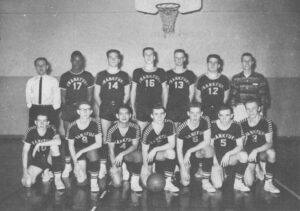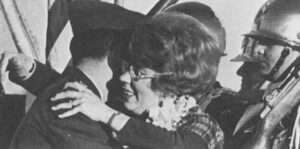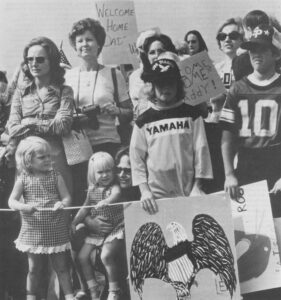Ann Banks
- 1979

Fellowship Title:
- Perspectives on the Military Family
Fellowship Year:
- 1979

Rolling Stones
(CAMBRIDGE, MASS.) For someone who grew up in a military family, the most ordinary opening rituals of conversation can cause momentary panic: “Where are you from?” “Well, I was born in Virginia.” “Yes, and then what?” “Then we lived in 15 different places.” Frequent family moves, intermittently to overseas bases, are a dominant feature of service life. In a transient society, the military leads the way in geographical mobility. The average American family pulls up stakes once every five or six years, but military families move twice that often. “You get awfully tired of leaving behind your pet cemetery,” recalls one woman whose father was a Navy pilot. As Sheldon Kopp, a psychotherapist who has treated many grown children of career military men, has noted, “Imagine how painfully disruptive it must be for a youngster to be repeatedly uprooted each time he or she has just about gotten used to living in a particular town, finally made friends, and learned to meet the expectations of an unfamiliar school.” 1 Of course, the relatively closed social

Debriefing
The changing of schools and adjustments to varied types of environment at home and abroad seems to advance rather than retard the average “Army brat”…It is not unusual to hear a five-year-old rolling off such jawbreaking names as Zamboanga, Fontainbleau, Kaiserslautern and Wiesbaden. Their geography is firsthand and their speech often has a little Japanese, French, German, or maybe Korean in it…They also know about earthquakes, typhoons, pythons, and perhaps a good bit about ambush and evasive tactics. – The Army Wife (A semi-official manual of etiquette and household management published by Harper and Row.) CAMBRIDGE, MASS. – I grew up in another country – a place with its own heroes, songs and customs, even its own unlikely vegetation. Whether in scrub pine country or the middle of the Western plains, the Army posts where I lived were always the same lush green. The same shade trees protected well-watered lawns that were always trimmed to the height specified in the Post Rules and Regulations. The flag was lowered in the same “retreat” ceremony at the

Saturday Night at the Officers’ Club
(FT. MYER, VIRGINIA)-Saturday evening the Officers’ Club is packed with couples dressed up for a night out. At first glance, the dimly lit red-carpeted lounge could be part of any Holiday Inn in the country. But there are a few reminders that this is not a civilian establishment: in the lobby an officer with an iron-grey crew cut complains to an employee about the slackness of the Club’s organization, comparing it unfavorably with his own command. Wine ordered in the bar is served in the same miniature bottles dispensed by airlines. And every few minutes the MUZAK is interrupted by a loudspeaker announcement that Col. So-and-so’s table is ready. The four middle-aged women seated around a corner table are the only women in the Club without escorts, and for them, this once-familiar scene has become awkward. “I feel perfectly comfortable being here,” one of them declares. “I don’t feel out of place.” Her companions nod their agreement, yet no one fails to notice the edge in her voice. For the truth is that they no

Treating the Bosun’s Mate
(SAN DIEGO)-Jeanne and Walter Simons * retirement house is on a small hill overlooking San Diego. From the picture window that wraps around two walls of their living room, the Simons can look directly out on the Naval installation where Captain Simons was stationed until he retired; to the right is San Diego Bay and the destroyer he once commanded. The Navy, the institution that shaped the Simons’ married life, surrounds them still, though in recent years they have lost the feeling of comfort they once derived from its structured environment. When Jeanne Simons “married into the Navy,” she was determined to do it right, to turn herself into the gracious “make-do artist” that is the ideal Navy wife. By her lights, this required following her husband wherever he was transferred, even briefly. Each move meant finding new housing (the Simons seldom lived on base), new schools for their children, new dentists, and new friends for all. When her husband was at sea for months at a time, she tried to be both parents to
Mrs. Custer’s Daughters
(WASHINGTON, DC) – When Elizabeth Custer journeyed with her husband to the Dakota Territory in the spring of 1873, Army wives had the status of camp followers. Official regulations entitled servants and laundresses to better treatment than wives, as Mrs. Custer complained in her memoir, Boots and Saddles. During the Indian campaigns, the Army garrisons on the western frontier provided family quarters only for senior officers, and the primitive living conditions discouraged all but the most intrepid wives. In peacetime the hardships of military family life were tempered by an elaborate and prescribed social circuit. The West Point graduates who dominated the officer corps fashioned a way of life they thought appropriate to an aristocratic elite. One legend from the days of the “Old Army–before the democratizing influence of World War II-warned a captain’s wife not to plant roses by the front door. If she made her yard too attractive, the wife of a senior officer might decide to pull rank and take over the quarters. Although such hierarchical excesses disappeared long ago, many traditions
